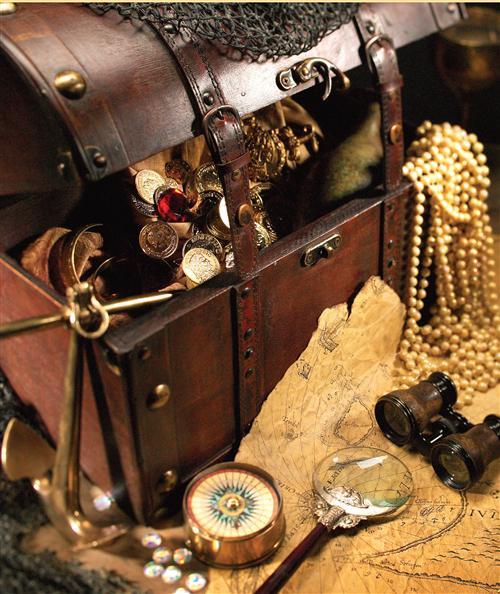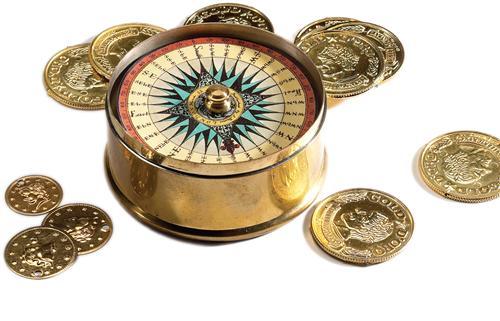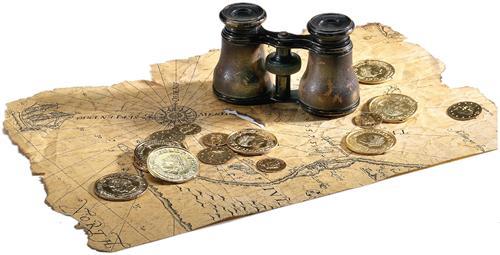Sign up for the Family Tree Newsletter Plus, you’ll receive our 10 Essential Genealogy Research Forms PDF as a special thank you!
Get Your Free Genealogy Forms
"*" indicates required fields
 Like those of us who dine in familiar restaurants and order the same menu items time after time, Web-surfing genealogists often stick to the tried and true online. After all, when you’ve had success at RootsWeb <www.rootsweb.com>, Cyndi’s List <www.cyndislist.com> or Family Search <www.familysearch.org>, why sample something else? But sometimes future favorites are right under your nose — like the kung pao chicken at that place where you always get the moo shu pork.
Like those of us who dine in familiar restaurants and order the same menu items time after time, Web-surfing genealogists often stick to the tried and true online. After all, when you’ve had success at RootsWeb <www.rootsweb.com>, Cyndi’s List <www.cyndislist.com> or Family Search <www.familysearch.org>, why sample something else? But sometimes future favorites are right under your nose — like the kung pao chicken at that place where you always get the moo shu pork.We’re guilty, too. Every year Family Tree Magazine rounds up the 101 best online destinations for genealogy, and it’s hard not to pick some of the same stellar sites. How can we not recommend the Ellis Island database <www.ellisisland.org>, for example, or US GenWeb <www.usgenweb.org>? These treasure troves of family history facts are such regulars on our browser menus that our mouses almost click to them automatically.
- Document Discoveries
- State Secrets
- Ethnic and Religious Revelations
- Foreign Exploration
- Hidden History and Reference Guides
- Unsung Collaborators
- Lesser-Known Tech Tools
Document Discoveries
American Battle Monuments Commission
Search for WWI, WWII and Korean War casualties buried in commission cemeteries or listed on the Walls of the Missing. Listings include name, rank, state, date of death, burial place and awards earned.
Ancestors at Rest
Scan the photos and transcriptions of coffin plates, funeral cards, obituaries, wills and other death records for your ancestors’ names. Then click on the Articles link for information about gravestone symbols and causes of death in the olden days.
BlackSheepAncestors.com
This fun site celebrating the scoundrels, rogues and outlaws in our family trees is also packed with useful data, such as state-by-state listings of prisons and inmates, plus biographies of worldwide pirates and buccaneers.
Cemetery Surveys
The team behind this site, focused mostly on Southeastern states, not only transcribes tombstone inscriptions, but also posts photos linked to each one. A simple site wide search lets you zoom to potential ancestors’ graves.
DAR Library GRC National Index
<members.dar.org/dar/darnet/grc/grc.cfm>
Search nearly 16 million names in 17,000 typescripts of records from across the country submitted to the Daughters of the American Revolution’s Genealogical Records Committee. If you find your ancestor, you can request copies using the DAR’s Search Service <www.dar.org/library/search.cfm> ($15 per request, up to 10 pages).
Directory of Corporate Archives in the United States and Canada
<www.hunterinformation.com/corporat.htm>
Start finding your kin’s occupational records with this guide to company archives, arranged by corporation, archivist and geographic area.
Family Tree Connection
<www.familytreeconnection.com>
This subscription-based data site ($29.95 per year) specializes in off-the-beaten-track records such as school catalogs, association memberships, orphanage records, insurance claims, donation lists, church records and fraternal-organization documents. Information spans 1830 to 1930 and comes mostly from US sources.
Family Tree Legends Records Collection
Even if you don’t use Family Tree Legends software, for $29.95 a year you can subscribe to the developers’ records collection, which covers birth, marriage, death, military, land, court and probate records, plus biography, history, geography and reference materials.
Godfrey Memorial Library
Here’s a deal: Just $35 a year gets you a God-frey Scholar library card (no need to live in Middletown, Conn., the library’s hometown) and remote access to subscription sites such as HeritageQuest Online (see below), Other-days.com <www.otherdays.com> and the New York Times 1851 to 2001 article archive.
HeritageQuest Online
Though this site is designed for institutional use rather than individual subscriptions, it’s worth inquiring whether your local library has access (if not, consider the Godfrey Memorial Library, above). Databases include the US census, 1790 to 1930 (with head of household indexes to most years); 25,000 family and local history books; Revolutionary War pension files and PERSI, the index to articles in thousands of genealogical journals.
Land Records Research Directory
This nicely organized site will give you a jump start in using land records. You won’t find actual records here, but each state gets an introduction and complete courthouse listing.
Nationwide Gravesite Locator
Search for burial locations of veterans and their dependents in Department of Veterans Affairs national cemeteries, state veterans cemeteries and other Department of Interior and military burial places. The site’s 3.2 million entries from national cemeteries go back as far as the Civil War.
Naturalization Records.com
Learn about naturalization and citizenship records with these detailed primers, then follow the links to online searches.
Old Directory Search
This modest but growing collection of digitized city directory pages includes such volumes as the 1892 Denver directory, 1844 Chicago directory, 1786 New York City directory, 1890 Philadelphia directory and 1837 Cleveland directory. If your ancestors were in the right place at the right time, this site could spell a breakthrough.
Pullman Collection
<www.rootsweb.com/~ssghs/pullman.htm>
Maintained by the South Suburban Genealogical and Historical Society (SSGHS) in Illinois, this site will get you started digging into the records of some 200,000 former Pullman Car Works employees. Fill out the form here and SSGHS will do a quick search of records from 1900 to 1949 for free.
Sampubco
Don’t be put off by this site’s bare-bones interface and almost adversarial tone. You can browse and search for free a variety of indexes to wills, naturalizations and intentions, guardianships and vital records, then order copies for a modest fee.
Sources2Go.com
Discover this online vault of more than 100,000 digitized government records, richest in city directories, census enumerations and military records. Sources2Go offers images of the entire 1790 US census for free, as well as bounty-land warrants from 1815 to 1858. Sources2Go even provides zooming and panning features resembling those on subscription sites. But it lacks indexes, so be prepared to browse. [Note: This site no longer exists.]
USAFuneralHomesOnline.com
<www.usafuneralhomesonline.com>
Even if you’re not looking to lay a dearly departed relative to rest, this comprehensive guide to the nation’s funeral homes can be a useful resource for tracking down your ancestors’ death records.
Vital Records in the United States
The Web has several guides to vital records, but we like this one’s clean organization scheme, uncluttered info and clickable map.
State Secrets
Civil War Florida
Browse the Master Soldier Index and descendant registry — both works in progress — then add information about your own Civil War ancestors to this well-designed Web site.
Colorado’s Historic Newspaper Collection
<www.cdpheritage.org/newspapers>
This collaborative project serves as the foundation for a statewide historical-newspaper database, beginning with 44 papers dating from 1859 to 1880. The database will include full-text indexing of all articles, graphics, letters to the editor and advertisements. You can view articles individually or in the context of the full newspaper page. Eventually, the project aims to encompass papers through 1923, a total of 1.6 million pages.
Digital Library of Georgia
Explore Georgia’s history and culture as found in digitized books, manuscripts, photographs, newspapers and other materials. Content ranges from 50,000 aerial photos and databases of historical books to Southeastern American Indian documents (1730 to 1842) and three newspapers (the Cherokee Phoenix, Dublin Post and Colored Tribune).
Georgia Archives
<www.sos.state.ga.us/archives>
Follow the “What do we have?” and online records links to search historical postcards, legislative documents and the Vanishing Georgia database of nearly 20,000 photos.
Kentucky Historical Society
Click on Research, then on Research Databases to access the society’s compilation of Kentucky cemetery records, which includes nearly 200,000 gravestone records from 3,000-plus cemeteries.
Long Island Genealogy
If your kin lived on Long Island, you won’t want to miss this rich Web site, offering everything from cemetery and to
wn records to colorful local history.
Louisiana State Archives: Confederate Pension Applications Index Database
<www.sec.state.la.us/archives/gen/cpa-index.htm>
Look for your Louisiana Confederates in this index of more than 49,000 names included in pension applications submitted to the state’s Board of Pension Commissioners.
Michigan Cemetery Sources
<michigan cemeteries.libraryofmichigan.org>
Search this Web directory of 3,700 Michigan cemeteries, then click the links to find transcriptions in books, microfilms and online.
New Mexico Ancestors
Begin exploring your New Mexico roots with this site’s 2 million record transcriptions, tombstone photographs and histories of the state’s ghost towns.
New York State Civil War Soldier Database
<www.archives.nysed.gov/a/researchroom/rr_mi_civilwar_ dbintro.shtml>
Muster up information about your fighting New York ancestor in this database: It documents 360,000-plus men who served with the New York State Volunteers, US Sharpshooter units and the state’s three regiments of “colored troops” during the Civil War.
North Dakota State University Institute for Regional Studies
<www.lib.ndsu.nodak.edu/ndirs/bio&genealogy>
If you have pioneer ancestors who braved the Upper Midwest prairies, this is the place to start looking for them. Among the d
atabases here are the 1885 Dakota Territory census, naturalization records and an index to more than 59,000 names in obituaries published in the Fargo Forum newspaper.
NYC Death Records Search
<www.italiangen.org/nycdeath.stm>
Volunteers from the Genealogy Federation of Long Island have created an online index to more than 2.7 million New York City death certificates. So far, the index covers 1891 to 1936, with coverage to 1948 in the works.
Online Archive of California
This site brings together historical materials from all over the Golden State. It encompasses more than 120,000 images; 50,000 pages of documents, letters and oral histories; and 8,000 guides to collections from California museums, historical societies and archives.
St. Louis Naturalization Cards Index
The St. Louis Genealogical Society has posted 93,000 index cards to city court naturalizations between 1816 and 1906, when the federal government took over the citizenship process. Transcriptions of the cards give the person’s country of origin, date and court of naturalization and names of witnesses. Check the user-friendly What Do I Do Next? page to learn how to find microfilm of the original cards and records.
The State of Wisconsin Collection
<digital.library.wisc.edu/1711.dl/WI>
You’ll find digitized books, manuscripts, sound recordings, photographs, maps and other resources in this online library. Materials include public documents, local histories, land survey records, and photos and maps of Milwaukee neighborhoods beginning in 1885.
Territorial Kansas Online
<www.territorialkansasonline.org>
This handsome site hosts hundreds of personal letters, diaries, photos and maps that bring to life the settling of Kansas and its bloody
debate over slavery.
Utah Census Search
<www.xmission.com/~nelsonb/census_search.htm>
Even if you don’t think you have Utah ancestors, you might find a relative or two by searching these 1850 to 1880 enumerations of Utah Territory — which, after all, also covered various parts of adjacent states.
West Virginia Memory Project
This site from the state archives includes a timeline, state documents, old photos, militia records, a periodical search and even a celebration of the Mountaineer State’s historical highway markers.
Ethnic and Religious Revelations
Africana Heritage Project
<www.africanaheritage.com> Based at the University of South Florida, this volunteer project aims to preserve and publish online records documenting the names and lives of slaves, freed persons and their descendants. The project taps library holdings, academic archives, plantation journals, public records, Freedman’s Bureau files, early church records, oral histories, family Bibles and more.
Archives of the Mennonite Church
This multitiered site rewards digging deep for your Mennonite roots, with collection inventories, an index to the Mennonite Historical Bulletin, and obituaries from weekly Mennonite newspapers spanning 1864 to 1998.
Catholiclinks.org
<www.catholiclinks.org/archivescatholiclinks.htm>
It’s no secret that church records are some of the most valuable genealogical resources. If you have Catholic kin, this site will point you to church libraries and archives worldwide.
Center for Jewish History
<www.cjh.org/family/genealogyrecords.cfm>
Search the center’s online databases, which include records from the Brooklyn Hebrew Orphan Asylum and the Hebrew Orphan Asylum of the City of New York, plus WWI soldier questionnaires administered by the American Jewish Committee.
Huguenot Historical Society
Search the library collection or join the Huguenot Street Forum, a genealogy bulletin board for exploring your Huguenot ancestry.
Presbyterian Historical Society
Query CALVIN, the society’s online catalog of more than 75,000 books, periodicals and processed archival collections. Other online resources include a registry of historic sites and background on Presbyterians in America.
Researching Your United Methodist Ancestors
If you have a Methodist minister or missionary in your family tree, use the form here to request information. The online conference directory can help you figure out where to write for lay records.
Shoah Victims’ Names
This database contains about 3 million names of Holocaust victims gathered from family members’ Pages of Testimony identity cards and other victim lists. You can search by name, birth city, place of last known residence, death camp or name of the submitter.
UNESCO Archives Portal
<www.unesco.org/webworld/portal_archives/pages/Archives/Religious_Communities_Archives>
This United Nations Educational, Scientific and Cultural Organization Archives Web portal links to more than 300 religious archives around the world.
Foreign Exploration
1837 Online.com
This new British pay-per-view site offers the 1861 census (so far, images from London, Middlesex, Surrey, Essex and Kent counties); an index of births, marriages and deaths (“BMDs”) from various time periods; and WWI, WWII and overseas BMDs. You can view, save and print up to 50 pages of images for about $9.
Automated Genealogy
In the works here is a free index to the 1901 Canadian census, with 5.4 million lines transcribed. Search on your ancestor’s name, then use the geographic data in the transcription to find an image of his record at the National Archives of Canada Web site <www.archives.ca>, which you can search only by geographic location, not by name. A similar index to the 1906 Census of the Northwest Provinces is also underway.
British History Online
This growing collection from the University of London and the History of Parliament Trust includes documents about the people, places and businesses of Britain’s medieval and early modern periods.
Burke’s Peerage & Gentry
Look for links to British nobility with this database of 1 million names in 7,000 family records, each scrutinized by a team of professional genealogists. Powerful search options include date, place of education, residences and more. You can subscribe for as little as 24 hours, starting at about $30.
Case Files for Early Immigrants to San Francisco and Hawaii
<groups.haas.berkeley.edu/iber/casefiles>
This collaboration between the University of California-Berkeley and the National Archives and Records Administration’s (NARA) Pacific Region helps you find ancestral needles in the haystack of immigration records at that NARA facility. The database indexes case files for nearly 250,000 immigrants who arrived in San Francisco and Honolulu between 1882 and 1955. Search on name, birthplace, port or ship; alternatively, links at the bottom of the search page will launch lists of entries alphabetized by last name. Use the details you find here to look up the actual case file at the Pacific Region in San Bruno, Calif.
Croatia in English
<www.croatia-in-english.com/gen>
Need help getting started on your Croatian roots research? Don’t miss this site’s seven step-by-step tutorials and other resources.
Dictionary of Canadian Biography Online
If you have ancestors from the United States’ neighbor to the north, they — or their relatives — might be in this huge online reference. The site provides access to the 14 volumes of the print edition to date, covering people who died between the years 1000 and 1930, and to a selection of biographies from unprinted volumes. You can search all the biographies by keyword; some let you query by identity/profession or by geographic region.
FamilyRelatives.org
Here’s yet another new pay-per-view Web site for British research. It contains all known civil-registration index images from 1866 to 1983, plus a searchable database for births, marriages and deaths from 1866 to 1920 and 1984 to 2002. That’s 300 million searchable records in all. The cost is modest: You get 60 “units” for about $10; accessing a record requires one to four units.
The Federation of Jewish Communities of the CIS
Get help researching your Jewish roots in 15 countries of the former Soviet Union. The federation can point you to ancestral towns and even kosher restaurants there.
The French Connection
<users.adelphia.net/~frenchcx>
Say oui to more than 500 pages on French Canadian ancestry, focusing heavily on connections to Maine and Acadian genealogy.
Genlias
This site gives a new meaning to being “in Dutch.” A joint product of the Netherlands’ regional history centers and state archives, Genlias has 5.7 million records on 25.5 million people, taken directly from the country’s Civil Register of births, marriages and deaths — the most important source for Dutch genealogical research from 1811 on. More records are being added, including marriage records from all provinces. (If you’re not fluent in Dutch, click on the English link in the upper right-hand corner.)
Genline
Though pricey (about $45 per month), this subscription site will revolutionize your Swedish genealogy research. Say goodbye to squinting at microfilm, as Genline brings more than 11 million church records — pretty much all extant records from every province — to your desktop in digitized form. And Genline’s accompanying Family Finder utility makes navigating the records a snap.
German Roots and Genealogy
<www.geocities.com/german_genealogy>
At this straightforward site, you’ll find oodles of links to German databases, ship lists, maps and how-to help.
Information Wanted
This database of “Missing Friends” might help locate your hard-to-find Irish ancestors. From 1831 to 1921, the Boston Pilot newspaper’s Missing Friends column carried advertisements from people looking for “lost” friends and relatives who’d emigrated from Ireland. The database contains a text record for each of the 31,525 ads that appeared in the Pilot.
InGeneas
This site focuses on Canadian passenger lists and other immigration documents, but also includes census, military, land and vital records.
It’s All Relative
Central European roots researchers will want to bookmark It’s All Relative, which offers tools and resources to help track down Czech, Bohemian, Moravian, Slovak, Lemko and Carpatho-Rusyn ancestors.
Library of Congress European Reading Room
Just because it’s “America’s library” doesn’t mean the Library of Congress (LOC) isn’t a valuable resource for your European research. This site gives an overview of the LOC’s collections and offers digitized books, including historical telephone directories for Romania and Poland.
The National Archivist
This commercial site has licensed databases from the United Kingdom’s archives — some free, others for modest fees. You’ll find digital images in collections such as Registers of Births, Marriages and Deaths at Sea (1854 to 1890) and Index to Divorce and Matrimonial Causes (1858 to 1903), plus military records, emigration and passport papers, directories, professional registers and British colonial documents.
Radix
Find your ancestors in Radix’s goulash of Hungarian historical records, including a searchable 1891 industry and trade directory, a 1913 gazetteer, a guide to 6,000 surname spelling alternatives and other resources.
The Research Program in Historical Demography
<www.genealogie.umontreal.ca/en>
Quebec researchers turn to this site’s database of 710,000 baptisms, marriages and burials recorded in Catholic parish registers before z1800. A basic search is free, but for more-in-depth information, you’ll have to subscribe for about $16 (this gets you 150 “hits,” or pages).
The Scotsman Digital Archive
It’s free to search this archive containing every issue of the Scottish newspaper published between 1817 and 1950, including news stories and birth, marriage and death notices. You’ll pay to view the actual articles, but you can learn a lot about your Scottish ancestors with a one-day pass for 7.95 pounds (about $15).
Swenson Swedish Immigration Research Center
<www.augustana.edu/administration/swenson>
Though you’ll have to visit the center in person to explore the actual archives, this handy Web site will get you started with how-to tips, genealogy links and PDF versions of the center’s newsletter.
Hidden History and Reference Guides
About Names
Learn all about the 2,000 most common American given names, along with 1,000 of their European counterparts. Names are grouped by common origin and meaning, allowing you to see at a single glance the 30 variants of Maria, for example.
American Cultural History
<kclibrary.nhmccd.edu/19thcentury.html> or <kclibrary.nhmccd.edu/decades.html>
Place your ancestors in historical context with these lively guides to the 19th and 20th centuries — you’ll find everything from basic facts and statistics to fads and fashions to education and technology. Profiles of each decade include suggested books for further reading.
Applied Language
<www.appliedlanguage.com/free_translation.shtml>
Stumped by that foreign phrase or Web site? This free online resource translates up to 150 words or any Web page between English and 10 different languages (even Chinese). You’ll find world maps and online foreign-language dictionaries here, too.
An Atlas of the German Empire
<www.library.wisc.edu/etext/ravenstein>
Though Ludwig Ravenstein’s 1883 atlas resides in the collection of the University of Wisconsin-Madison, its online incarnation will be of most interest to genealogists with central European roots. Its large-scale, thorough gazetteer of place names and mapping of church locations make the atlas invaluable to families with origins in any part of the German empire from the late 19th century to the early 20th century. Maps also cover bordering portions of present-day Austria, Belgium, the Czech and Slovak republics, Denmark, France, Hungary, Lithuania, Luxembourg, the Netherlands, Poland, Russia and Switzerland.
Conservation Online
Though aimed at professional conservators, this site can help even amateurs learn about family heirloom preservation, copyright and intellectual property issues, digital imaging and solutions to problems ranging from mold to bugs. Start with the Conservation/Preservation Information for the General Public link.
Early American History
This lively collection of written accounts from the 1700s and 1800s warns, “This is probably not the same history that you learned in school.” Clicking through these documents is like interviewing your early American ancestors — listening to real people, not the famous folks who made the history books — express their thoughts, feelings and ambitions. As the site’s introduction puts it, “Here is the real pioneer spirit at its best and worst.”
Encyclopedia of Genealogy
Get answers to your genealogy reference and how-to questions at this free, user-contributed “encyclopedia,” the brainchild of genealogy computer guru Dick Eastman.
ePodunk.com
Find those obscure and obsolete ancestral towns with this searchable guide to 45,000 cities, villages, towns and townships across America. Search on a place name, and you’ll find the name of the county, the county seat and links to various genealogical resources.
Film Forever
Save those old home movies for future generations with an assist from this in-depth guide aimed at preserving home films, not just Hollywood productions. (You might want to let that scene of you as a baby in the bathtub fade away, though.)
Gazetteer of British Place Names
Find your British ancestral home with this exhaustive place-name index. Its 50,000-plus entries cover commonly accepted alternative spellings, as well as Welsh and Gaelic versions.
Map History
<www.maphistory.info/sum.html>
Besides an introduction to the history of cartography, this site serves up thousands of links to old-map sites — including hundreds with digitized images — to help you trace your ancestors’ whereabouts.
New York Times Articles Archive $
<pqasb.pqarchiver.com/nytimes/advancedsearch.html>
Search the nation’s newspaper of record from Sept. 1851 to Dec. 1995 — more than 15 million articles in all, part of the ProQuest Archiver service. Searching is free; if you get a hit on a newsworthy ancestor, a single article in PDF format costs $2.95. (Note that you can tap the same content with a membership to the Godfrey Memorial Library.)
Unsung Collaborators
All Surnames Genealogy
Follow the links to more than 2,000 surname Web sites, and register your family’s own surnames to connect with kin.
Family Tree Circles
Family Tree Circles goes beyond uploaded GEDCOM files to let you create and share an online research journal, which can include stories, questions, brick walls, tips and advice. You can browse or search other users’ info so that once you find someone researching a related line, it’s easy to keep up with his or her latest finds.
Genes Reunited
When searching for pedigrees, don’t overlook overseas connections. This is the United Kingdom’s largest family tree site, with more than 31 million people listed.
Heritage Recipes
<www.heritagerecipes.com/Recipes.htm>
Get the flavor of yesteryear — literally — with this exchange of “recipes that our mothers, grandmothers and great-grandmothers shared with their daughters and friends and used every day.” This may be the only genealogy-related site that’s bad for your waistline, as the recipes are heavy on baked goods such as Aunt Reet’s Rolls, Grandmama’s Banana Cake, Grandpa’s Cherry Cake and Mom’s Amaretto Pound Cake. The webmasters invite you to share your own family favorites.
Looking 4 Kin
Maybe someone in this friendly site’s genealogy chat room can solve your brick-wall problem. You’ll also find an extensive list of well-categorized links here.
LostCousins
Although limited in scope so far, this British site offers an intriguing model for connecting with kin. Simply register (it’s free), enter the names of ancestors you’ve found in the 1881 censuses of England, Wales and Scotland, and the site will automatically search its databases for your cousins. Future census connections are in the works.
TribalPages
We thought the Web had enough pedigree-sharing sites until we discovered TribalPages, a free service that lets you not only share but also document and view your family history online. Besides searching the database of 12 million-plus names, you can store your own data and get online charts and reports.
Lesser-Known Tech Tools
A9
<a9.com>
Looking to add new weapons to your Web-search arsenal? This slick search engine from Amazon.com can comb Web sites, books, digital images, reference works, movies and yellow pages all in one fell swoop. It then groups results by source (that is, Web, books, images and so on).
Answers.com
This portal provides just what its name implies — on a million topics, covering people, places, words and names. It draws information from reliable sources, including online dictionaries and encyclopedias. Try drilling down through various topics to find handy reference material: For example, the places category serves up city and regional maps, currency converters, area codes, country flags, statistical data and more.
Clusty
Clusty’s worth adding to your bag of Web-surfing tricks because of its unique “clustering” of results. Search for your surname plus “family history,” for example, then weed out the chaff and go straight to the good stuff by clicking on the hits Clusty groups under the genealogy topic.
Daily Genealogy News.com
Find out what’s new in searching for what’s old. This site combines various RSS (Really Simple Syndication or Rich Site Summary) feeds, updated every four hours. There’s also a genealogy search tool that lets you target online census, cemetery, obituary, land and other records with one search.
Family Tree DNA
Among the many genetic-genealogy testing companies’ Web sites, this one stands out for its wealth of free information, DNA forum, monthly newsletter, library of scientific papers and free FTDNATiP calculator that allows two matching individuals to estimate the number of years back to their shared ancestor.
GenealogyBuff.com
Search for your surname in dozens of family history databases with one click. Though you still have to visit each site to see the results (or find out your search came up empty), Genea-logyBuff.com can be a good starting point for online research.
Genetealogy
Megan Smolenyak Smolenyak, co-author of Trace Your Roots with DNA (Rodale, $14.95), is behind this new online clearinghouse for genetic-genealogy information. As DNA grows in importance for family historians, we bet you’ll turn increasingly to Genetealogy’s links to online articles, testing companies, message boards, surname projects and recommended books and videos.
MacGenealogy.org
Mac users who feel left out by the Windows-centric world of genealogy software can find solace and suggestions at this newsy site.
My Family Health Portrait
<www.hhs.gov/familyhistory/download.html>
Free genealogy software from Uncle Sam? This simple downloadable program helps you combine your family tree and family medical history, then print a chart you can take to your doctor’s office.
One-Step Webpages
End your frustration with popular genealogy sites’ search limitations. Steve Morse, who made searching the Ellis Island database a snap, has applied his Web wizardry to other ports of immigration, vital-records databases and, most notably, the US census.
OurTimeLines.com
Enter events from your ancestor’s life, then let this site generate a timeline you can paste into your own Web site.
Sorenson Molecular Genealogy Foundation
If you’ve had a Y-DNA test, you can use this nonprofit genetic-genealogy research organization’s site to compare results with 12,000 genetic profiles, linked to genealogies of 480,000-plus ancestors that represent at least 7,900 surnames around the world.
TreEZy
Think Google for genealogy: TreEZy indexes sites with genealogical and historical content, not just lists of links. There’s even a downloadable toolbar à la Yahoo! or Google.
UKWizz
Classic Hits
Although we focused this year’s 101 Best Web Sites roundup on previously undiscovered sites, it’s still worth extolling some of our all-time favorites. These 25 genealogical hot spots have made at least four of our five annual roundups, and they consistently reveal new clues about our kin.
AfriGeneas
Ancestry.com
<Ancestry.com >
Bureau of Land Management General Land Office Records
Civil War Soldiers & Sailors System
Cyndi’s List
Ellis Island
FamilySearch
Federation of East European Family History Societies
Free BMD
GenCircles
Genealogy.com
Genealogy Resources on the Internet
<www.rootsweb.com/~jfuller/internet.html>
Genealogy Today
GeneaNet
GENUKI
Interment.net
JewishGen
Making of America
<www.hti.umich.edu/m/moagrp> and <cdl.library.comell.edu/moa>
NewEnglandAncestors.org
Newspaper Abstracts
RootsWeb
USGenWeb
Western States Historical Marriage Records Index
<abish.byui.edu/specialcollections/fhc/gbsearch.htm>
Where to Write for Vital Records
<www.cdc.gov/nchs/howto/w2w/w2welcom.htm>
WorldGenWeb
ADVERTISEMENT





